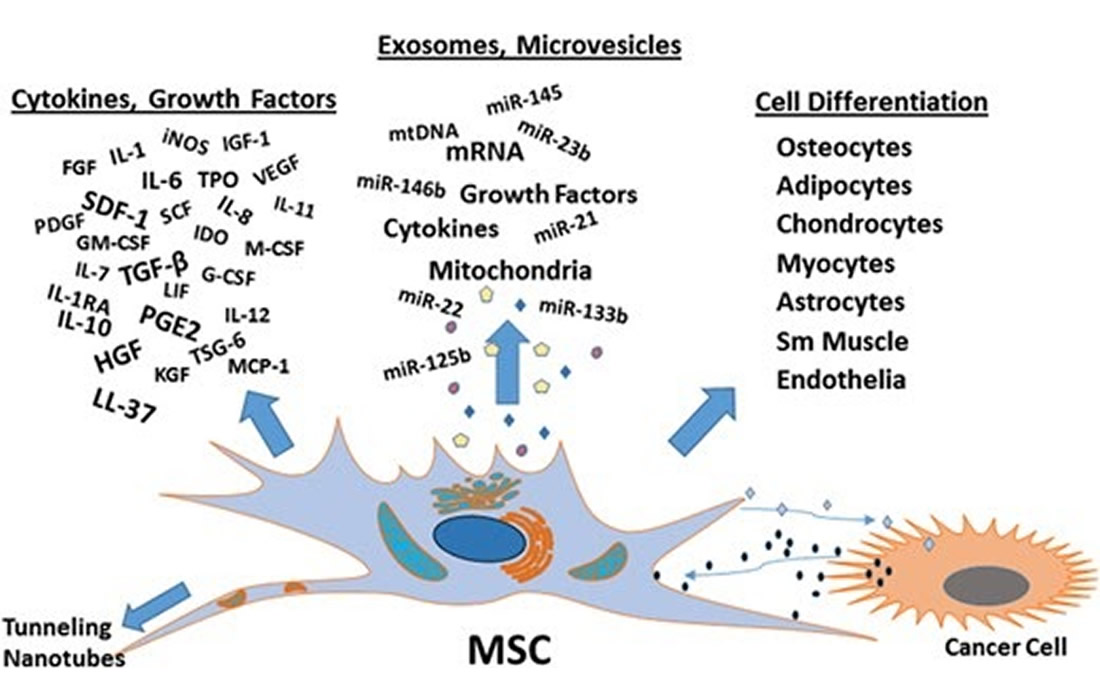Stem Cell Therapy for Specific Conditions
MSC-Derived Exosomes for Cell-Free Therapy
Mesenchymal stem cells (MSCs) transplantation is undergoing extensive research as cellular therapy for human clinical trials. Because they can be easily isolated and expanded in vitro there is a natural desire to test MSCs in many diverse clinical indications.
Mesenchymal stem cells can differentiate into different lineages, and they produce many cytokines and growth factors that influence other cells producing decreased inflammation, enhanced progenitor cell proliferation, and improved tissue repair.
In past years it was thought that MSC-based therapies augmented the structure and function of damaged or diseased tissues via direct cell replacement. However, it is now known that MSCs affect tissue repair largely via their paracrine factors and stimulation of host cells, and not by only cell replacement.
MSCs-Derived Exosomes
More recently, MSCs-derived extracellular vesicles (EVs), which include exosomes and microvesicles (MV), are being examined for their role in MSC-based cellular therapy. These vesicles are involved in cell-to-cell communication, signaling, and altering cell or tissue metabolisme at short or long distances in the body.
These microvesicles (>200 nm) and exosomes (∼50–200 nm) encapsulate the cytokines, growth factors, RNAs and miRNAs in diverse combinations. Some studies have shown results very similar to MSC transplantation in many cases.
The majority of our cells produce extracellular vesicles as a consequence of intracellular vesicle sorting. What happens is that when the cell produces a growth factor, cytokine or other cellular product, they are encapsulated in these vesicles, which are called endosomes while inside of the cell. They then mature into late endosomes to be released as exosomes upon fusion of the endosome with the cell surface.
Studies Using Exosomes
In 2007, a study by Timmers et al. confirmed earlier reports that medium conditioned by human embryonic stem cell (ESC)-derived MSCs (hESC-MSCs) significantly reduced infarct size in both pig and mouse models of myocardial ischemia/reperfusion (MI/R) injury.
In another study Camussi and colleagues demonstrated that MSC derived microvesicles prevented kidney injury.
A study by Hong-Xu et al. found that exosomes are a good therapeutic approach for Parkinson’s disease in a rat model and that it could both decrease the neurodegenerative changes of the disease and also have a neuroprotective effect on the dopaminergic neurons, which are the commonly affected cells in this condition.
Ruenn Chai Lai et al. demonstrated that culture medium conditioned by human embryonic stem cells exosomes significantly reduced infarct size by approximately 50% in a pig and mouse model of myocardial ischemia/reperfusion injury when administered intravenously in a single bolus just before reperfusion.
Conclusions
The use of MSC-derived exosomes in human patients has several potential advantages. Their use avoids the transfer of cells, the vesicles are small and circulate readily whereas MSCs are larger, and the dose of infused exosomes can achieve a higher dose that circulates to a greater extent than larger cells.
Some disadvantages of using exosomes alone is that they are static and more cannot be produced in vivo as may be possible when transplanting the cell itself. The question then arises as to the potency of the vesicles and the therapeutic dose.
Further and larger studies are needed in order to have more data on the therapeutic efficacy, the best doses, and the source of the exosomes.
Sources:
Donald G. Phinney, Mark F. Pittenger. Concise Review: MSC-Derived Exosomes for Cell Free Therapy. 2017. Stem Cells. Volume 35, Issue 4, Pg 851-858. https://doi.org/10.1002/stem.2575
Hong-Xu Chen, et al. Exosomes derived from mesenchymal stem cells repair a Parkinson’s disease model by inducing autophagy. Cell Death Dis. 2020 Apr 27;11(4):288. doi: 10.1038/s41419-020-2473-5.
Ruenn Chai Lai, et al. Mesenchymal stem cell exosome: a novel stem cell-based therapy for cardiovascular disease. Regenerative Medicine, Vol. 6, No. 4. Jul 12, 2011.
Image from:
Donald G. Phinney, Mark F. Pittenger. Concise Review: MSC-Derived Exosomes for Cell Free Therapy. 2017. Stem Cells. Volume 35, Issue 4, Pg 851-858. https://doi.org/10.1002/stem.2575

